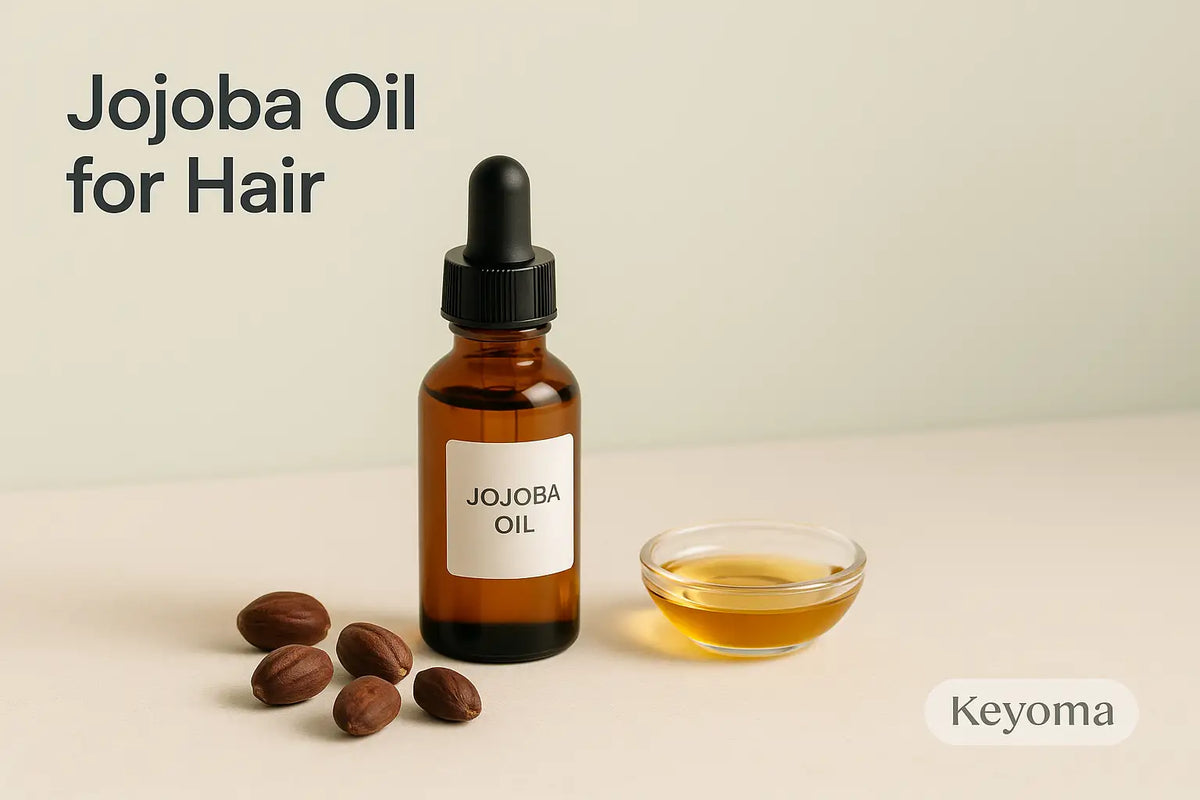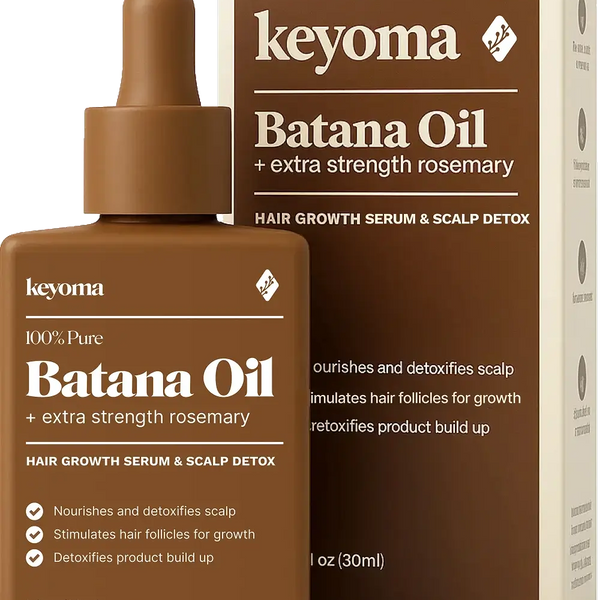In this article
Hair oils are popular for adding moisture, repairing rough spots, and boosting shine. When it comes to jojoba oil, many experts say this plant-derived oil can be great for hair and skin. People have used jojoba in skin and hair care for centuries because it closely resembles the scalp’s natural oils.
Below, you’ll learn jojoba oil’s benefits, when to apply it, how long to leave it on, and some favorite jojoba-infused picks. Think of it as a simple guide to using jojoba oil for your hair.
Key Takeaways
-
Jojoba oil is a liquid wax resembling sebum, widely used in haircare.
-
No clinical research shows regrowth, and it does not reduce DHT or extend anagen.
-
Benefits include moisturizing dry hair, balancing scalp oil, and easing itch or dandruff.
-
It can protect against heat damage, smooth frizz, and help remove buildup.
What Is Jojoba Oil?
Jojoba oil is a liquid wax pressed from the seeds of Simmondsia Chinensis, the jojoba plant. It’s made up of almost 98 percent pure wax. Even though it pours like an oil, it’s mostly wax esters, which is why people still call it an “oil.”
The jojoba shrub grows in desert regions of the Southwestern United States and North America, including Colorado, California, and parts of New Mexico. For generations, Native American tribes used the plant’s oil for wound care and a range of skin concerns.
Today, the cosmetics industry uses jojoba oil in many nourishing products, from creams and body oils to lip balms and stylers. It’s a common ingredient in shampoos, conditioners, and other natural hair formulas.
Can Jojoba Oil Promote Hair Growth?
Current evidence suggests there aren’t studies showing jojoba oil lowers DHT in your body or at the scalp, so it’s unlikely to prevent hair loss from male pattern baldness. There’s also no proof that it reactivates dormant follicles or lengthens the anagen (growth) phase of your hair cycle.
In one animal study, researchers compared 3% minoxidil, peppermint oil, jojoba oil, and saline in mice. They reported jojoba oil stimulated growth less than minoxidil or peppermint oil.
Right now, there are no clinical human studies on jojoba oil for hair growth. That means we don’t yet know if it’s effective or even appropriate as a hair loss treatment.
So, don’t count on jojoba oil to spark growth, wake up follicles, or reverse the early signs of balding.
Instead, use it for what it does well, like smoothing strands, cutting frizz, and lowering the chance of dry hair or a flaky, dry scalp.
Key Benefits of Jojoba Oil for Hair
Jojoba isn’t a true oil by nature. It’s an oil-like wax ester, which makes it different from many essential oils. Its texture is similar to sebum from your skin, so it’s non-comedogenic and won’t clog pores. Here are some hair care benefits linked to jojoba oil:

1. Helps Control Dandruff
Jojoba oil can serve as a natural dandruff helper. That’s likely tied to its ability to support the scalp’s pH and regulate sebum. Depending on severity, you can use it before shampooing or as a light leave-in on the scalp.
2. Moisturises Hair
Jojoba oil has strong moisturizing properties, making it a solid hydrator for hair. Behenic and oleic acids can support follicle roots and help keep your scalp’s oil balance steady. Its soothing, nourishing qualities may also ease dryness and reduce flaking.
It can calm an itchy scalp as well. People also use jojoba oil on scalp conditions like eczema and psoriasis. A recent dermatological review notes that moisturizing the hair and scalp is one of jojoba oil’s key benefits.
3. Helps Repair Heat and Styling Damage
You can use jojoba oil to address damage from hot tools and chemical processes. Applying it to hair forms a protective layer that helps guard against heat. Unlike some oils, jojoba is less permeable, which contributes to this barrier effect.
That’s one way to limit breakage when you use curling irons or straighteners. Frequent hot-tool use can lift and crack the cuticle. Smoothing on jojoba oil after styling may help reduce that breakage.
4. Noncomedogenic and Cleansing Properties
Jojoba oil can help dissolve excess sebum that clogs scalp pores. It also works as a gentle cleanser to lift greasy buildup and dust from hair and scalp. Its restorative feel is why it shows up in many hair products.
5. Helps Maintain the Scalp’s Natural Balance
Jojoba oil contains antioxidant and antimicrobial properties that can support pH balance and restore moisture on the scalp. It helps moisturize without leaving hair greasy or prompting excess oil production.
6. Supports Hair Growth and Thickness
Rich in vitamins and minerals, jojoba oil is often praised for overall hair health. Vitamins B, C, and E plus minerals like zinc and copper can nourish strands so they feel stronger and thicker. A study on peppermint oil and hair growth also tested jojoba oil and reported very helpful effects for growth.
7. May Help Prevent Premature Graying
Pollution, dust, and stress can play a role in early greying. Jojoba oil can act like a shield for your hair. A lack of copper is another factor in grey hair, and jojoba oil contains a range of vitamins and minerals. Adding it to your routine may help guard against premature greying.
How to Use Jojoba Oil in Your Routine

There are several easy ways to add jojoba oil to your hair routine.
1. Apply directly. Warm a small amount first so it spreads easily. I noticed warming the oil reduced tugging and helped distribute it evenly. You can heat it in a clean pot on the stove or in a microwave-safe bowl. Use about 1 tbsp for short hair and 2 tbsp for long hair. Apply above the scalp and smooth down to the ends. Leave it on for roughly 20 minutes, then shampoo, condition, and rinse.
Avoid coating the scalp directly to prevent clogged pores. If you’re treating dry scalp or dandruff, use only a tiny amount on skin (about 1–2 drops).
2. Add to products. Mix a few drops of jojoba oil (about 3–5 drops) into a dollop of your usual shampoo or conditioner before you use it.
3. Purchase products that contain it. Choose a shampoo or conditioner with jojoba oil listed among the natural ingredients. This is often the simplest way to work it in.
Learn More About Natural Hair Care With Keyoma
Now that you know what jojoba oil can do for moisture, frizz, and scalp comfort, and where it falls short for regrowth, use it strategically.
Apply small amounts to mid-lengths and ends, choose lighter blends if your hair is fine, and patch test if your skin is sensitive. Keep expectations modest and pair it with proven treatments when needed.
For clear routines, ingredient explainers, and research updates, follow Keyoma’s blog and social channels for practical hair care tips.
Featured Product
100% Pure Batana Oil + Rosemary









